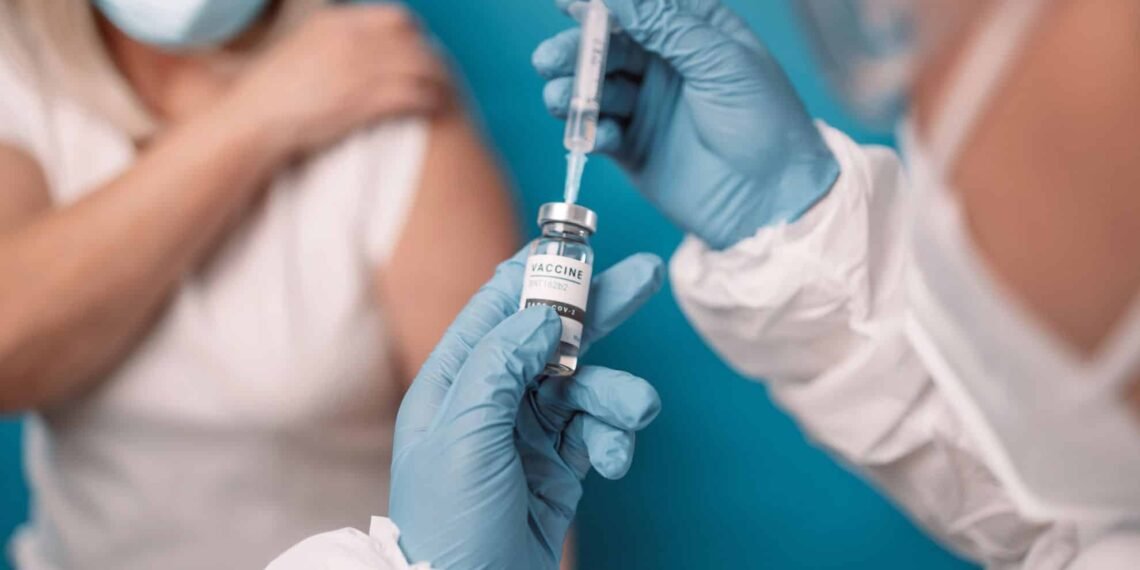The Trump administration, through HHS Secretary Kennedy, has shifted COVID-19 vaccination guidance, removing routine recommendations for healthy children and pregnant women. This decision contradicts current CDC risk assessments and has drawn criticism from leading medical organizations.
BY PC Bureau
In a significant shift in public health guidance, healthy American children and pregnant women will no longer be routinely recommended to receive COVID-19 vaccinations. The announcement was made on Tuesday by Health and Human Services (HHS) Secretary Robert F. Kennedy Jr., who hailed it as a step towards fulfilling a promise to “Make America Healthy Again.”
This decision by the Centers for Disease Control and Prevention (CDC) marks a departure from their previous broad recommendation for COVID-19 vaccination for everyone aged 6 months and older. While Secretary Kennedy specified that the recommendation would no longer apply to “healthy pregnant women,” the criteria for determining who qualifies as “healthy” in this context remain ambiguous, particularly as the CDC itself currently lists pregnancy as a condition that elevates the risk of severe COVID-19 complications.
The announcement has triggered immediate and widespread concern within the medical and scientific communities. The American College of Obstetricians and Gynecologists (ACOG) issued a strongly worded statement expressing “extreme disappointment” with the HHS decision. ACOG emphasized the well-established dangers of COVID-19 infection during pregnancy, both for the expectant mother and for newborns who rely on maternal antibodies acquired through vaccination for crucial early protection. The organization underscored that the scientific understanding of these risks has not changed and that COVID-19 infection during pregnancy can lead to catastrophic outcomes and long-term disability.
🚨BREAKING: RFK Jr. confirms the CDC has removed the COVID shot from its recommended immunization schedule for healthy kids and pregnant women. A stunning reversal. But this isn’t justice—it’s damage control. Who will answer for the lives forever changed? pic.twitter.com/8jUNkZ3pJ6
— Next News Network 🇺🇲 (@NextNewsNetwork) May 27, 2025
Echoing these concerns, infectious disease experts and pediatricians have questioned the rationale behind the policy change. Dr. Paul Offit, director of the Vaccine Education Center at Children’s Hospital of Pennsylvania, pointed out that even if severe illness is less common in healthy children, they still experience symptomatic COVID-19, including conditions like bronchiolitis and bronchitis, raising questions about the justification for removing routine preventative measures. Dr. Richard Besser, former acting director of the CDC, expressed deep concern that this decision does not appear to be based on the best available science and the consensus of expert advisors, which he had relied upon during his tenure.
READ: Kuki-Zo Council Lauds Manipur Governor’s Peace Efforts, Criticizes COCOMI
This policy shift follows closely on the heels of an announcement by Food and Drug Administration (FDA) Commissioner Dr. Marty Makary, who indicated the agency’s intention to restrict the use of COVID-19 shots primarily to older adults and individuals with underlying medical conditions. Dr. Makary also stated that new COVID-19 vaccines for healthy children and adults would be subject to lengthy placebo-controlled clinical trials before they could be considered for approval. This new requirement for rigorous, extensive trials could significantly delay the availability of updated booster shots for all age groups.
Secretary Kennedy, who has a long and vocal history of opposition to various vaccines, including the COVID-19 shot, had previously filed a petition in 2021 requesting the FDA to revoke the authorization of these vaccines. He has also made unsubstantiated claims about the COVID-19 vaccines being the “deadliest vaccine ever made,” citing rare instances of myocarditis in young men, despite studies indicating that the risk of myocarditis is actually higher and often more severe following a COVID-19 infection itself.
The implications of this change in recommendation extend beyond individual health decisions. The CDC’s guidance is a crucial factor in determining which vaccines insurance companies cover at no cost to patients. If routine COVID-19 vaccination is no longer recommended for healthy children and pregnant women, there are significant concerns that private insurers and government programs like Medicaid might cease to cover the cost of future boosters for these populations. This could lead to decreased accessibility and lower uptake of the vaccine, even if individuals wish to receive it.
READ: COCOMI Delegation Meets MHA Amid Surge in Valley Protests
Dr. Offit warned of a potential “cascade of events,” where reduced CDC recommendations lead to insurance companies not paying for the vaccine and the Vaccines for Children Program, which provides free vaccines to uninsured children, also ceasing coverage. This would make the vaccine more expensive and less available, ultimately leading to lower utilization.
While there are currently no federal mandates for COVID-19 vaccination in the U.S., experts have consistently emphasized the ongoing need for vaccination, particularly for vulnerable populations, including older adults, immunocompromised individuals, and, until now, pregnant women. The experience during the height of the pandemic demonstrated the severe risks COVID-19 posed to pregnant individuals, with hospitals reporting unprecedented surges in hospitalizations and critical care admissions. Physiological changes during pregnancy can weaken the immune system, increasing susceptibility to complications from respiratory viruses like COVID-19. Recent research has even indicated a spike in maternal deaths coinciding with the pandemic.
The discrepancy between the new HHS announcement and the CDC’s own website, which as of Tuesday afternoon still recommended COVID-19 vaccination for everyone 6 months and older, further adds to the confusion and uncertainty surrounding this policy shift.
The long-term consequences of this change in guidance remain to be seen, particularly concerning the potential for future surges of the virus and the protection of vulnerable populations. The focus now shifts to understanding the specific criteria for “healthy” pregnant women, the implications for insurance coverage, and the timeline for the new required clinical trials for updated vaccines. The public health community will be closely monitoring the impact of this decision on vaccination rates and overall health outcomes.














